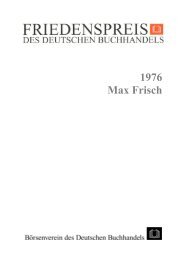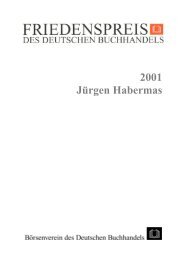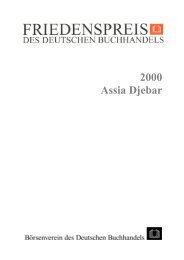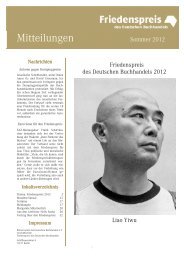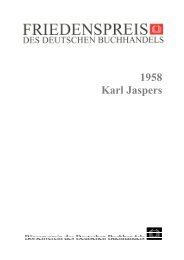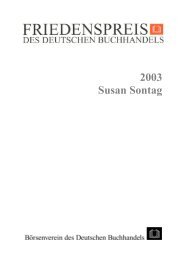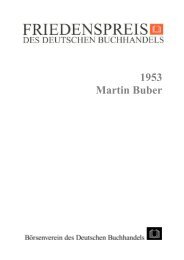2011 Peace Prize speeches - Friedenspreis des Deutschen ...
2011 Peace Prize speeches - Friedenspreis des Deutschen ...
2011 Peace Prize speeches - Friedenspreis des Deutschen ...
Create successful ePaper yourself
Turn your PDF publications into a flip-book with our unique Google optimized e-Paper software.
<strong>Peace</strong> <strong>Prize</strong> of the German Book Trade <strong>2011</strong><br />
Gottfried Honnefelder, President of the German Publishers and Booksellers Association<br />
Greeting<br />
Humankind’s richness lies in its diversity<br />
and colorfulness. Indeed, who would want to do<br />
without the variety of ethnicities, each of which<br />
is a unique combination of heritage, language,<br />
religion and culture. Together, this variety of<br />
differences forms an almost inexhaustible spectrum<br />
of perspectives – each of which is equally<br />
different and distinct – with which we view the<br />
world and ourselves. It is a spectrum that one<br />
perspective alone will never be able to fully<br />
grasp.<br />
Each of these perspectives represents a<br />
homeland for the individual born into it. It is<br />
through these perspectives that individuals find<br />
their world and themselves – just as the language<br />
in which we learn to give our first answers<br />
informs the source of our speaking, of our native<br />
tongue. It is this medium – the medium of what<br />
was first familiar – in which we gain the outlook<br />
on life that lends us our sense of self and makes<br />
us capable of social interaction.<br />
But the differences that make us unlike one<br />
another also allow the “other” to appear as the<br />
unfamiliar “foreigner” – something which can<br />
seem fascinating at the same time as unsettling<br />
and hostile. As indispensible as it is for all individuals<br />
to have roots in a nexus of language,<br />
origin and culture, differences in ethnicity, religion<br />
and culture can also trigger mutual hatred,<br />
appear as a <strong>des</strong>tructive disturbance to larger<br />
power entities or become the bone of contention<br />
between competing powers.<br />
Indeed, it seems that ethnic dissimilarities<br />
become a special problem precisely in the process<br />
of dissolving and forming more comprehensive<br />
state entities – those which characterize<br />
modern times – whether it be in the form of a<br />
claim to power by one ethnic group over another<br />
or in the suppression of all or a single ethnic<br />
group in favor of a dominant, higher-ranking<br />
claim to power. Whenever these kinds of strategies<br />
of domination are combined with totalitarian<br />
claims of an ideological nature, we see various<br />
kinds of repressive mechanisms, terrorist threats,<br />
wars of extermination and even genocide<br />
take the place of the rivalries between tribes and<br />
2<br />
cultures that have always accompanied human<br />
history.<br />
No one knows the simultaneous richness<br />
and potential threat of ethnic diversity – a diversity<br />
born of an abundance of histories, languages<br />
and religions – better than someone who not<br />
only lives and speaks in it, but also writes about<br />
it in such a way as to bring to light the distinctiveness<br />
that shapes the different worldviews<br />
and their co-existence. The person who writes in<br />
this way can – and, indeed, must – become a<br />
witness, someone who resists and must resist<br />
when the richness that he experiences while<br />
writing is at risk of perishing or falling silent.<br />
This individual knows that it is precisely the<br />
encounter with the “other,” with the “foreign,”<br />
that allows the self to emerge in its own distinctiveness.<br />
Only when seen in the light of other<br />
traditions and values am I able to understand my<br />
own tradition in a way that allows its potential to<br />
emerge in its entire fullness and binding force. It<br />
is precisely the other’s differentness that allows<br />
it to become the foil of one’s own self. Indeed,<br />
cultures are enriched – rather than dissipated –<br />
when they become aware of other cultures.<br />
However, this of course presupposes the ability<br />
to see the world and oneself through the<br />
other’s eyes. The extent to which this ability<br />
gains traction will solely determine whether an<br />
integrating humankind will also become human<br />
– a humankind whose unity is not owed to totalitarian<br />
claims to power but, rather, to a diversity<br />
of origins.<br />
Those who know Boualem Sansal and his<br />
work will be aware that, up until now, I have<br />
been talking about nothing else than the situation<br />
in which he lives in today’s Algeria and<br />
about the way in which he raises his voice as an<br />
author. It is the quality of his testimony and the<br />
courage with which he bears witness that we<br />
honor today.<br />
*




